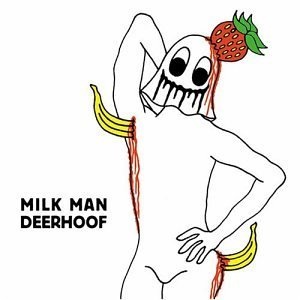
Deerhoof
Milk Man
[Kill Rock Stars; 2004]
Rating: 7.6
If pop is auto mechanics, then over the past few years, Deerhoof have completely unassembled the Benz. Deerhoof’s excitement in toying with the building blocks of pop songwriting– and their characteristically short, almost infantile attention span– energized Reveille and Apple O’ to near-unparalleled levels of melodic potency, while the music’s lack of any discernable patterns kept listeners continually stimulated, wondering what might come next. By the time of Apple O’s release last year, it was clear that the San Francisco quartet had come to understand the mechanics of melody-making, and, more importantly, that pop, when too saccharine, eats itself. But Deerhoof never compromised their melodies to avoid potential schmaltz; rather, they kept their lines short and to the point, coating the songs with well-placed sheets of noise and fragmented melody. And yet, Deerhoof have never come off calculated or bookish. In fact, they seem to stumble upon their ideas: Their songs are strings of perfectly fortunate accidents, explosive and radioactive, but also instable and always on the verge of self-collapse.
At least with automobiles, there’s a practical endpoint to mechanical deconstruction, but even with endless possibilities for combination (I wonder what happens when I hook the steering wheel up to the CD player?), one can only tinker for so long before the ideas become elaborate enough that the car must be rebuilt to support them. Deerhoof have reached a similar point in their career. With the exception of Holdy Paws, the band’s songs have never seemed to aspire to "song status"; they were basically well-assembled sequences of simple and powerful ideas– even one-minute tracks like "Holy Night Fever" covered a tremendous amount of musical ground.
On Milk Man, Deerhoof harness all they’ve learned from their previous experiments, and written what may be their first truly conventional songs. Here, they’ve focused their maniacal energy into seriously dense and carefully considered songwriting; even the cleaner and deeper production betrays Deerhoof’s commitment to letting the songs speak for themselves, and to keeping individual parts as precise and undistracting as possible. Greg Saunier’s drumming is the most restrained I’ve ever heard it, while Chris Cohen and John Dieterich– who are of such one (brilliant) mind that in concert they can play in perfect tandem without ever looking at each other– find themselves more concerned with static harmonies and more dominant of their precious miasmatic outbursts. Satomi Matsuzaki, meanwhile, has improved considerably as a singer, and is now capable of delivering remarkably complex vocal melodies. And with more developed vocal melodies comes Deerhoof’s first crack at meaningful lyrics: Over the course of this record’s 11 tracks, Satomi narrates a coherent (if somewhat disturbing) story about a milk man who kidnaps children and hides them in the clouds.
So is this Deerhoof’s best? Is Milk Man, as SPIN remarked, "a perfect album?" It isn’t, unfortunately, but the album plays host to what are easily some of Deerhoof’s best songs, conventional or otherwise. Four-minute opener "Milk Man"– longer than nearly every other song Deerhoof has recorded– is as much a statement of the album’s overall tenor as it is of the band’s change of pace: Unaccompanied guitar lines interact confidently, building sparse but lush harmonies that together function as the song’s recurring theme. The keyboard, which was noticeably absent from Apple O’, returns here with remarkable subtlety, a respondent to Satomi’s pristine melody. The internal interactions within the song– as opposed to the external reactions of the band members– are the focal point of "Milk Man", possibly Deerhoof’s finest moment.
"Desaparecere" may be as good as the title track. Set to a drum machine, the quiet song boasts Milk Man’s most complex harmonies, built entirely from keyboard sounds and Satomi’s razor-sharp Spanish delivery and glissandi. Not a note is out of place. The song marks the first time Deerhoof have indulged so openly in the clicks-and-cuts of minimalist beatmaking, and it’s done to beautiful effect. "C", originally released on seven-inch in 2002, finds a place on the album perhaps for its similar degree of restraint; here, Deerhoof experiment with slow, static harmony composition and phaseshifted white noise, as Satomi squeaks out a poignant minor-key melody and Greg taps out frantic snare rolls. What’s most noteworthy about "C" is its terrifying use of space, particularly in the moment before a tense guitar chord is resolved by Satomi restating her melody on keyboard.
The three songs I mention above– and to a lesser extent "Giga Dance" and "Milking"– are simply fantastic; the rest of Milk Man, however, performs at a frustratingly lower level. The instrumental "Rainbow Silhouette of the Milky Rain" boasts a brilliant, spidery guitar duet in 3/4 time, but is otherwise an incongruous, ill-conceived medley of mediocre riffs and uninteresting drumming, while "Dog on the Sidewalk" seems completely pointless, an unusual misstep for Deerhoof. And the album’s last four tracks, while hardly offensive, sound somehow unfinished in comparison to the album’s high points.
Milk Man is certainly not some point of no return for Deerhoof– they certainly aren’t locked into writing in this more conventional style, just as they weren’t locked in after the similarly song-oriented Holdypaws. The band is too committed to growing as musicians and writing better songs not to revisit the rambunctious Reveille and Apple O’ woodsheds for inspiration. Milk Man not only testifies to how potent those sessions proved, but also to how successfully the band can step back and craft those rabid ideas into impressive songs without devitalizing them.
-Nick Sylvester, March 10, 2004
